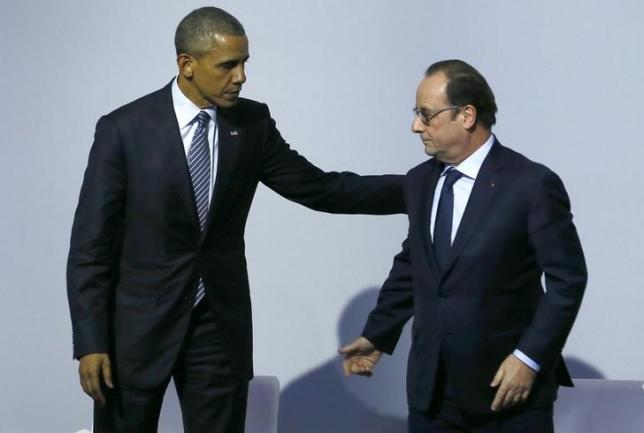Condemning attacks, leaders in Paris make careful leap to climate change
PARIS: For world leaders attending a long-planned climate summit in Paris just weeks after 130 people were killed by Islamic State militants in the French capital, addressing the coincidental convergence of global warming and terrorism was unavoidable.
In a series of some 150 opening speeches at the heavily guarded facility on the outskirts of Paris, most heads of state and prime ministers offered condolences to their French hosts, pivoting quickly, sometimes awkwardly, to the climate talks.
Many said the decision to press on with the summit in Paris so soon after the attacks was itself a rebuke to extremists trying to sow fear and disrupt normal life. French President Francois Hollande said the two issues were inseparable, "two big global challenges" to be addressed for the next generation.
A few, including US President Barack Obama, went further, linking the threat of heatwaves, floods and drought to the potential for climate refugees and political instability.
He warned of a possible future with "political disruptions that trigger new conflicts, leaving more floods of desperate peoples seeking the sanctuary of nations not their own."
Prime Minister Charles Michel of Belgium, a nation on high alert after the Nov. 13 attacks in Paris involved at least two suicide bombers from Brussels, also cited climate change as "the cause of tension, inequalities, crises and conflicts."
But it was Prime Minister Enele Sopoaga of the Pacific island nation of Tuvalu who made by far the most direct link, voicing an idea that has become a newly contentious aspect of the climate issue: "the effects of climate change ... we strongly believe is also the cause of radicalism and terrorism."
"The plight of refugees we see today ... and increasing terrorism and radicalism, represents a small measure of what the world, mankind, will face if we do not tackle climate change."
A connection between a warming planet and migrant-related instability has in recent years been cautiously cited in several places as an additional rationale for cutting back on carbon emissions, and has drawn more attention in recent weeks after comments by both US Secretary of State John Kerry and Democratic presidential candidate Bernie Sanders.
"By fuelling extreme weather events, undermining our military readiness, exacerbating conflicts around the world – climate change is a threat to the security of the United States and, indeed, to the security and stability of countries everywhere," Kerry said in a speech in Virginia on Nov. 10.
Last week, Britain's Prince Charles said that one of the "major reasons for this horror in Syria" was climate change. He made no mention of those ideas in Paris on Monday, beyond worrying that the world's focus was being diverted by other crises "that can be seen as greater and more immediate threats."
The comments have provoked a sharp rebuke from many critics, particularly Republicans in the United States, who see it as a purely political effort to use fears over public safety to drive an unrelated climate agenda.
Some studies have made the connection. In 2013, a panel of UN scientists said climate change could "indirectly increase risks of violent conflicts by amplifying well-documented drivers of these conflicts such as poverty and economic shocks."
A paper in the US journal Proceedings of the National Academy of Sciences in March said there was evidence that man-made climate change had contributed to a 2007-10 drought in Syria that was a contributing factor to the civil war.
Back in Paris, a few speakers made little effort at a graceful segue.
After saying that both Israel and France were the victims of terrorism, Israeli Prime Minister Benjamin Netanyahu went on: "If President (Palestinian President Mahmoud) Abbas is committed to peace he must stop inciting his people against Israel."
Shifting tack, he continued: "Today we must focus on the security, not just of the nations of the world, but of the world itself."






